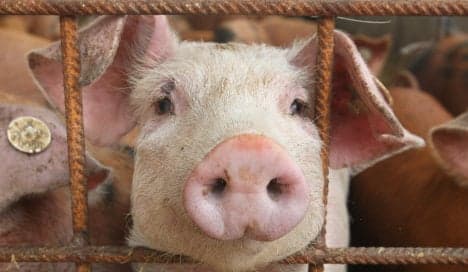High levels of dioxin found in German pork

German authorities Tuesday ordered the slaughter of hundreds of pigs after finding high levels of dioxin in pork for the first time since shutting down thousands of farms for tests last week.
"A test on the meat has shown high levels of dioxin content," Gert Hahne, a spokesman for the Agriculture Ministry in the state of Lower Saxony, told news agency AFP. "The animals must be slaughtered and will then be incinerated."
Previous tests had found higher than permitted levels of dioxin, which can cause cancer, in eggs and in three chickens, according to the federal Agriculture Ministry.
Authorities destroyed around 100,000 eggs and late on Thursday Germany closed down around 4,700 of its 375,000 farms across the country while tests were conducted.
The northern German farm at the centre of the latest alert was one of thousands supplied with animal feed containing suspect fatty acids. As a consequence it was among those shut down, meaning it could not have moved or sold its pigs.
The firm which supplied the ingredients is suspected of knowingly selling some 3,000 tonnes of fatty acids meant only for industrial use.
Pork from a second farm nearby was found to have levels of dioxin close to the maximum permitted level, the state's agriculture ministry said in a statement.
The suspect firm, raided by police last week, supplied around 25 companies which mixed the fatty acids in up to 150,000 tonnes of contaminated feed that was then delivered to farms around Germany.
South Korea suspended imports of German pork and Slovakia halted sales of German eggs and poultry meat last week, measures criticised by the European Commission as disproportionate.
Most of the 4,700 farms have since been reopened, however, and the government had voiced hopes that others would swiftly follow suit. As of Monday, 558 farms were still subject to restrictions.
The government has said throughout that there was no immediate risk to public health, and that it believed none of the suspect animal feed was exported.
The European Commission said on Monday, however, that some feed was in fact exported to France and to Denmark. Around 136,000 eggs were also exported to the Netherlands, some of which ended up in Britain.
Demand for organic eggs, which are unaffected by the scare, has shot up, experts and shopkeepers said Tuesday, while anecdotal evidence suggests that sales of organic meat are also on the rise.
The German government has vowed to crack down hard on those behind the scare and has said it wants to look at tightening regulations in order to prevent a repeat.
AFP/mry
Comments
See Also
"A test on the meat has shown high levels of dioxin content," Gert Hahne, a spokesman for the Agriculture Ministry in the state of Lower Saxony, told news agency AFP. "The animals must be slaughtered and will then be incinerated."
Previous tests had found higher than permitted levels of dioxin, which can cause cancer, in eggs and in three chickens, according to the federal Agriculture Ministry.
Authorities destroyed around 100,000 eggs and late on Thursday Germany closed down around 4,700 of its 375,000 farms across the country while tests were conducted.
The northern German farm at the centre of the latest alert was one of thousands supplied with animal feed containing suspect fatty acids. As a consequence it was among those shut down, meaning it could not have moved or sold its pigs.
The firm which supplied the ingredients is suspected of knowingly selling some 3,000 tonnes of fatty acids meant only for industrial use.
Pork from a second farm nearby was found to have levels of dioxin close to the maximum permitted level, the state's agriculture ministry said in a statement.
The suspect firm, raided by police last week, supplied around 25 companies which mixed the fatty acids in up to 150,000 tonnes of contaminated feed that was then delivered to farms around Germany.
South Korea suspended imports of German pork and Slovakia halted sales of German eggs and poultry meat last week, measures criticised by the European Commission as disproportionate.
Most of the 4,700 farms have since been reopened, however, and the government had voiced hopes that others would swiftly follow suit. As of Monday, 558 farms were still subject to restrictions.
The government has said throughout that there was no immediate risk to public health, and that it believed none of the suspect animal feed was exported.
The European Commission said on Monday, however, that some feed was in fact exported to France and to Denmark. Around 136,000 eggs were also exported to the Netherlands, some of which ended up in Britain.
Demand for organic eggs, which are unaffected by the scare, has shot up, experts and shopkeepers said Tuesday, while anecdotal evidence suggests that sales of organic meat are also on the rise.
The German government has vowed to crack down hard on those behind the scare and has said it wants to look at tightening regulations in order to prevent a repeat.
AFP/mry
Join the conversation in our comments section below. Share your own views and experience and if you have a question or suggestion for our journalists then email us at [email protected].
Please keep comments civil, constructive and on topic – and make sure to read our terms of use before getting involved.
Please log in here to leave a comment.